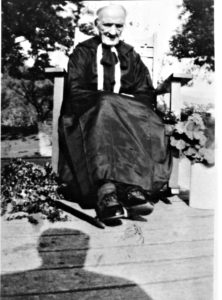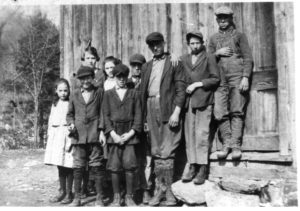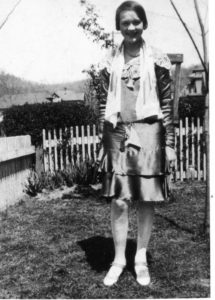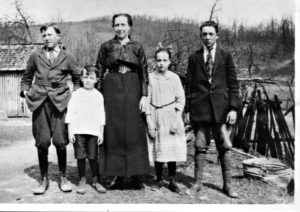Another way the hill people of my family differ from J.D. Vance’s in Hillbilly Elegy is in the area of marriage. J.D. grew up surrounded by instability and tumultuous home life both in his home and the home of his grandparent’s. The story of Granny Lawhorne’s married life painted a very different picture.
My grandmother Henson lived with us for about 5 years before I was married. She loved to tease me about Ed who had started coming around to see me. We were so poor we didn’t have no mop so when it came time to scrub the floors, I’d put on my brother’s overalls and get down on my hands and knees to scrub the floor. Grandmother Henson would mumble and giggle around her corn cob pipe saying, “I hope he don’t ketch ya'” The more she would say it the more she would giggle. She tried to make me think Ed wouldn’t want to marry me if he saw me dressed like a man!
When Ed and I decided to get married he was 19 and I was 15 years old. We went to the preacher’s house and who was there but two other boys who had always tried to go with me. One boy’s name was Lawrence Wilmer and the other was Lacy Coleman. Lacy said he was going to try to keep Ed from having me but I’d already decided I didn’t want to have nothing to do with him because he drank. Funny thing years later after Ed died of a massive stroke Lacy and I did marry–of course he had stopped
drinking by then! Mama would have never let me marry a Wilmer because she said they were all lazy!
Ed and I married on Independence Day 1928. We often celebrated our anniversary by splitting open a ripe watermelon that had been kept cold in the spring box at the home we shared.
For the first 7 months of my married life we lived with Mr. Paul Lawhorne–Ed’s father. Paul was a man who really cared about the way he looked to others. It took him a solid hour to get ready to go anywhere. Everyone was always waiting on Paul to get ready.
Ed had gotten a job at the silk mill in Buena Vista when we first got married. It was so unlike our people who cut wood, or farmed as a living but here was Ed going to the “city” for a public job. It seemed like some of our relatives were jealous thinking we had “gotten above our raisings.” Ed just always wanted his children to do well and worked hard to provide for them. His mother died of “Bright’s disease” — some kind of kidney problem when Ed was only 8 years old. Her name was Leanna Coleman and she was 49 years old when she passed. She said to Paul, “Now Paul, take the children to church and raise them like I did.” Paul did just that for the children.
I was the one that told Ed we needed to get a place of our own. I always felt that Mr. Lawhorne didn’t like us living with him and the house over the mountain was real crowded so we got a place on Factory Street in Buena Vista.
In June of 1929, Junior was born while we lived on Factory Street. Dr. Thurman looked at how big his hands were and said, “Oh my goodness, he’s going to be as big as Joe Winston!” Joe was the biggest, strongest black man in Buena Vista at the time. I was proudest of that boy as anything in my life. I remember feeling like I finally had something that belonged to me. I never had a doll or nothing like that as a girl so this little boy was something special!




